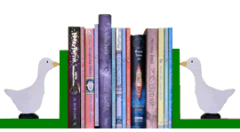At the Romance Writers of America’s conference in 2013, there weren’t enough takers to fill all the available appointments with publishers and agents. This news filled me with excitement because it signals the big change in the world of publishing that I’ve been dreaming of – the time when self-publishing became easy enough for authors to choose as their preferred route instead of beating at the barriers set up by the publishers and agents.
It’s not surprising that it’s happening first with romantic novelists because romance sells particularly well in ebook format. But I’m sure this change will soon spread and become unstoppable, sweeping through the world of books and forcing publishers and agents to rethink how they work.
For too long, authors have been the underdog in the publishing system. All the power lay with the publishers who could get books into bookshops and the agents who could get books into publishers. The fact that authors produced the content everyone else was making money from didn’t give them much importance. With so many others vying to get work published, demand from publishers was easily outstripped by supply so the system treated authors as expendable.
The situation has deteriorated since I was first published in 1990. Negotiating publishing contracts has become progressively more difficult, and non-competing works clauses have changed from a reasonable attempt to stop you selling almost exactly the same book to someone else into a totally unreasonable attempt to control what the author writes for the rest of their career. In return, advances have dwindled, high discount clauses have eroded print royalties and ebook royalties have become stuck at 25% of net receipts.
At the same time, many agents have lost sight of the fact that authors employ them and started acting as if they are the employers. One example of this is the way some agents insist on exclusive submissions. If a builder said he would only quote for fixing my bathroom if I promised not to ask anyone else for a price, I would walk away in disgust. But for years, authors have accepted the same approach from agents because they didn’t have much choice.
As the impact of self-publishing works its way through the industry, publishers have three choices.
- They can put their fingers in their ears, sing “la la la” and try to pretend that nothing has changed.
- They can switch to trying to make money directly from authors by charging them high fees to produce their books. Penguin has already gone down this route by buying Author Solutions, one of the largest and least respected self-publishing companies in the world (currently being sued in the US ). But they are not the only ones. Simon and Schuster has set up its own high priced service, Archway Publishing, in partnership with Author Solutions.
- They can accept that times have changed and offer authors improved contracts and a bigger share of the profits. They can start accepting direct submissions instead of demanding that authors give 10-15% of their income to agents, just to save publishers’ time. And they can stop insisting that ebooks cost the same to produce as print books. Any author who has self-published knows that isn’t true.
If publishers want to survive, they need to change the way they work with authors and change the way they run their companies. Maybe they should rethink the huge overhead involved in running prestigious offices in London and New York and start cutting their costs to suit the new reality.
Agents face an even grimmer future because their traditional role as middleman is disappearing. Some will survive by selling foreign rights for self-published authors, but many may need to look for another job entirely.
One thing is certain. The huge change in the way publishing works is going to leave casualties in its wake, and some of them may be big. So, if you’re signing a contract with a publisher or agent, pay particular attention to what happens if they go bust or sell out to someone else.
Diana Kimpton
Use our search page to find the right editor, designer or illustrator to help produce your book.

Comments are closed.